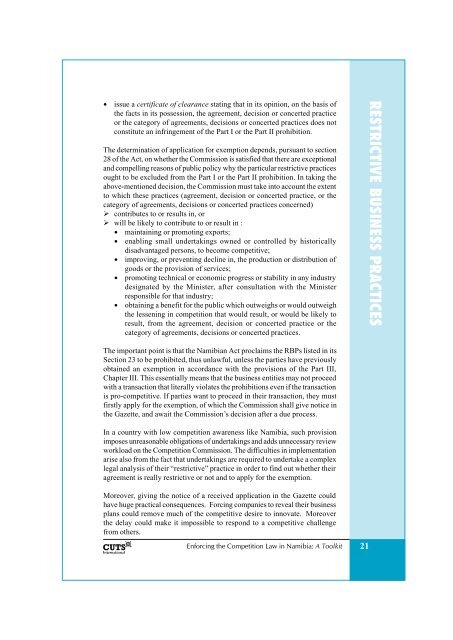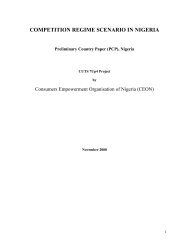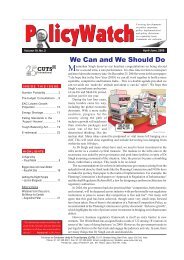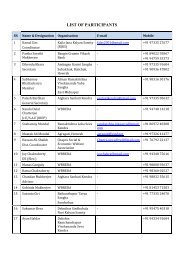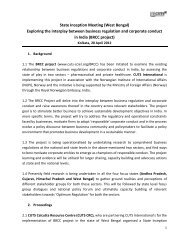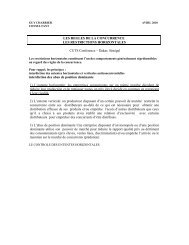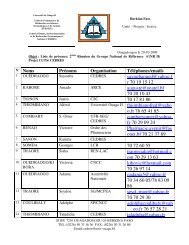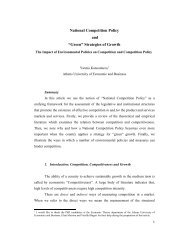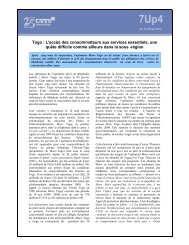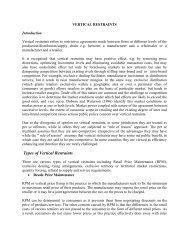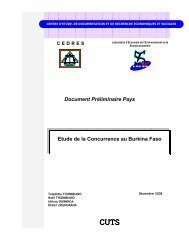Enforcing the Competition Law in Namibia A Toolkit - cuts ccier
Enforcing the Competition Law in Namibia A Toolkit - cuts ccier
Enforcing the Competition Law in Namibia A Toolkit - cuts ccier
Create successful ePaper yourself
Turn your PDF publications into a flip-book with our unique Google optimized e-Paper software.
• issue a certificate of clearance stat<strong>in</strong>g that <strong>in</strong> its op<strong>in</strong>ion, on <strong>the</strong> basis of<strong>the</strong> facts <strong>in</strong> its possession, <strong>the</strong> agreement, decision or concerted practiceor <strong>the</strong> category of agreements, decisions or concerted practices does notconstitute an <strong>in</strong>fr<strong>in</strong>gement of <strong>the</strong> Part I or <strong>the</strong> Part II prohibition.The determ<strong>in</strong>ation of application for exemption depends, pursuant to section28 of <strong>the</strong> Act, on whe<strong>the</strong>r <strong>the</strong> Commission is satisfied that <strong>the</strong>re are exceptionaland compell<strong>in</strong>g reasons of public policy why <strong>the</strong> particular restrictive practicesought to be excluded from <strong>the</strong> Part I or <strong>the</strong> Part II prohibition. In tak<strong>in</strong>g <strong>the</strong>above-mentioned decision, <strong>the</strong> Commission must take <strong>in</strong>to account <strong>the</strong> extentto which <strong>the</strong>se practices (agreement, decision or concerted practice, or <strong>the</strong>category of agreements, decisions or concerted practices concerned)Ø contributes to or results <strong>in</strong>, orØ will be likely to contribute to or result <strong>in</strong> :• ma<strong>in</strong>ta<strong>in</strong><strong>in</strong>g or promot<strong>in</strong>g exports;• enabl<strong>in</strong>g small undertak<strong>in</strong>gs owned or controlled by historicallydisadvantaged persons, to become competitive;• improv<strong>in</strong>g, or prevent<strong>in</strong>g decl<strong>in</strong>e <strong>in</strong>, <strong>the</strong> production or distribution ofgoods or <strong>the</strong> provision of services;• promot<strong>in</strong>g technical or economic progress or stability <strong>in</strong> any <strong>in</strong>dustrydesignated by <strong>the</strong> M<strong>in</strong>ister, after consultation with <strong>the</strong> M<strong>in</strong>isterresponsible for that <strong>in</strong>dustry;• obta<strong>in</strong><strong>in</strong>g a benefit for <strong>the</strong> public which outweighs or would outweigh<strong>the</strong> lessen<strong>in</strong>g <strong>in</strong> competition that would result, or would be likely toresult, from <strong>the</strong> agreement, decision or concerted practice or <strong>the</strong>category of agreements, decisions or concerted practices.RESTRICTIVE BUSINESS PRACTICESThe important po<strong>in</strong>t is that <strong>the</strong> <strong>Namibia</strong>n Act proclaims <strong>the</strong> RBPs listed <strong>in</strong> itsSection 23 to be prohibited, thus unlawful, unless <strong>the</strong> parties have previouslyobta<strong>in</strong>ed an exemption <strong>in</strong> accordance with <strong>the</strong> provisions of <strong>the</strong> Part III,Chapter III. This essentially means that <strong>the</strong> bus<strong>in</strong>ess entities may not proceedwith a transaction that literally violates <strong>the</strong> prohibitions even if <strong>the</strong> transactionis pro-competitive. If parties want to proceed <strong>in</strong> <strong>the</strong>ir transaction, <strong>the</strong>y mustfirstly apply for <strong>the</strong> exemption, of which <strong>the</strong> Commission shall give notice <strong>in</strong><strong>the</strong> Gazette, and await <strong>the</strong> Commission’s decision after a due process.In a country with low competition awareness like <strong>Namibia</strong>, such provisionimposes unreasonable obligations of undertak<strong>in</strong>gs and adds unnecessary reviewworkload on <strong>the</strong> <strong>Competition</strong> Commission. The difficulties <strong>in</strong> implementationarise also from <strong>the</strong> fact that undertak<strong>in</strong>gs are required to undertake a complexlegal analysis of <strong>the</strong>ir “restrictive” practice <strong>in</strong> order to f<strong>in</strong>d out whe<strong>the</strong>r <strong>the</strong>iragreement is really restrictive or not and to apply for <strong>the</strong> exemption.Moreover, giv<strong>in</strong>g <strong>the</strong> notice of a received application <strong>in</strong> <strong>the</strong> Gazette couldhave huge practical consequences. Forc<strong>in</strong>g companies to reveal <strong>the</strong>ir bus<strong>in</strong>essplans could remove much of <strong>the</strong> competitive desire to <strong>in</strong>novate. Moreover<strong>the</strong> delay could make it impossible to respond to a competitive challengefrom o<strong>the</strong>rs.<strong>Enforc<strong>in</strong>g</strong> <strong>the</strong> <strong>Competition</strong> <strong>Law</strong> <strong>in</strong> <strong>Namibia</strong>: A <strong>Toolkit</strong> 21


